As part of top to bottom benchmarking of all Intel Xeon E3-1200 V3 processors over the next few weeks, we are now looking at the Intel Xeon E3-1230 V3. The Intel Xeon E3-1230 V1 and V2 were both very popular processors. The E3-1230 model designation is usually the lowest priced quad core, eight thread processor. That makes it attractive for many that can see a significant performance jump over the E3-1220 in many instances. With the Haswell Xeon generation, we expect to see a 5-15% IPC improvement although clock speeds are going to remain largely the same. Sandy Bridge to Ivy Bridge had a small IPC boost, a new process shrink to 22nm, and a small bump in clock speeds. Haswell, as we have seen brings significant savings in terms of idle power consumption. All told, we are expecting lower idle power consumption with this generation of E3-1230. Let’s see how the Intel Xeon E3-1230 V3 compares.
Haswell Xeon Test Configuration
To perform the testing we are using a review platform similar to what we used in in the Sandy Bridge, Ivy Bridge and even the older Xeon 3400 series generation. The goal is to provide a somewhat barebones processor platform typical of the datacenter use case where the server nodes are meant to fit easily within 1A per U power envelopes.
- CPU: Intel Xeon E3-1230 V3
- Motherboard: Supermicro X10SLL-F
- Memory: 16GB Kingston ECC 1600 CL11 DDR3 2x 8GB UDIMMs
- OS Drive: OCZ Vertex 4 256GB
- Enclosure: Norco RPC-4224
- Power Supply: Corsair AX750 750w 80Plus Gold PSU and PicoPSU 150XT with 150w power brick for power consumption testing.
- OS: Ubuntu 12.04 LTS
Nothing too exciting here. We will have more motherboard reviews in the near future. This should be a fairly typical configuration in the web hosting market.
Intel Xeon E3-1230 V3 Benchmarks
In previous Haswell benchmark articles, such as the Intel Xeon E3-1270 V3 review, we looked at both Linux and Windows benchmarks. Since we provided some guideposts in the Windows results, we are now focusing on the Linux benchmark suite.
Hardinfo Performance
hardinfo is a well known Linux benchmark that has been around for years. It tests a number of CPU performance aspects.
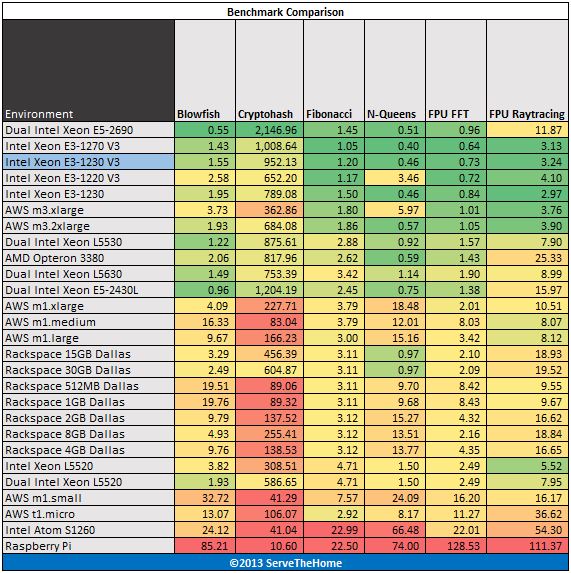
Here we see the Intel Xeon E3-1230 V3 clearly start to distance itself from the Intel Xeon E3-1220 V3. At the same time we can see the clock speed of the Intel Xeon E3-1270 V3 show an advantage.
UnixBench 5.1.3 Performance
UnixBench may be a defacto standard for Linux benchmarking these days. There are two main versions, one that tests single CPU performance on that tests multiple CPU performance. UnixBench segments these results. We run both sets of CPU tests. Here are the single threaded results:
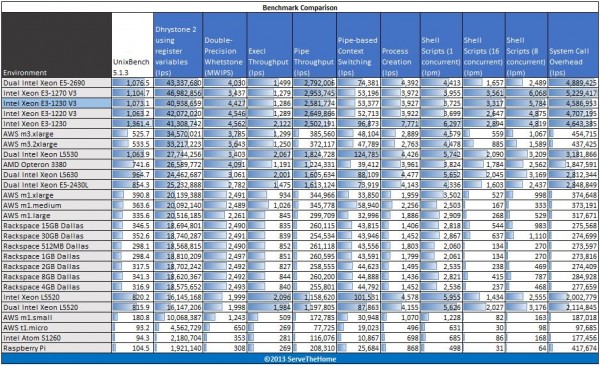
In terms of single threaded performance, the Intel Xeon E3-1230 V3 does well with the modern Haswell architecture and relatively high clock speeds. When we look at multi-threaded performance, we can see the benefit of hyper-threading.
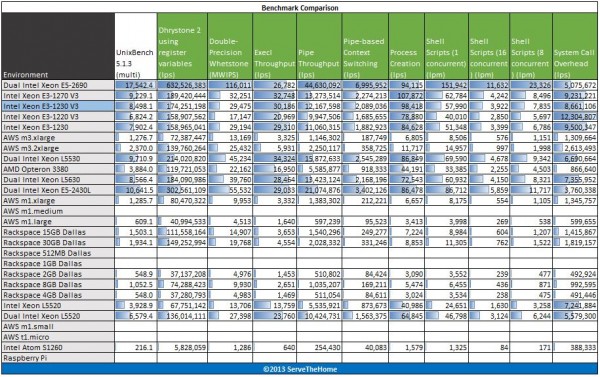
One interesting point here is the Amazon Web Services m3.xlarge and m3.2xlarge instance types are obliterated in terms of performance by this sub $300 processor. Of course, this is not a cost comparison, but it does give one an idea in terms of relative performance.
c-ray 1.1 Performance
c-ray is a very interesting ray tracing benchmark. It provides both consistent results and some clear separation. Ray tracing is generally a great multithreaded CPU benchmark. For this test we use both a simple 7500×3500 render and a more complex 1920×1200 render. Here are the results:

Again we see the Intel Xeon E3-1230 V3 perform in line with expectations on the c-ray 1.1 benchmark.
Crafty Chess Performance
Crafty is a well known chess benchmark. It is also one where we saw issues last time with the Phoronix Test Suite and running on ARM CPUs. Here are the Crafty Chess results from simply running “crafty bench”:
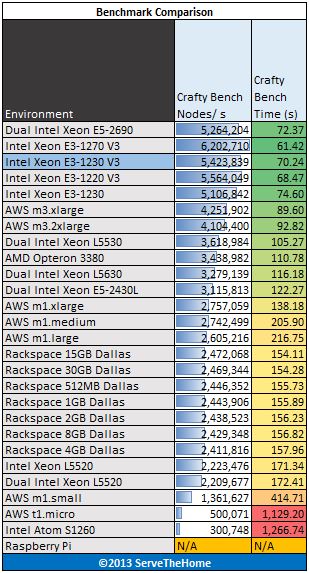
Here again we see a strong showing with the Intel Xeon E3-1230 V3. In this single-threaded test, the E3-1230 V3 performs relatively well thanks to the clock speed and Haswell IPC combo.
Phoronix Test Suite Performance
We are using four tests from the Phoronix Test Suite: pts/stream, pts/compress-7zip, pts/openssl and pts/pybench.
- STREAM by John D. McCalpin, Ph.D. is a very well known memory benchmark benchmark. S
- 7-zip compression benchmarks were a mainstay in our Windows suite so we are including it again on the Linux side as a compression benchmark.
- The pts/openssl benchmark is very dependent on the CPU architecture being used
- Python is a widely used scripting language and pyBench is a nice single-threaded Python benchmark.
Here are the results of the Phoronix Test Suite benchmarks:
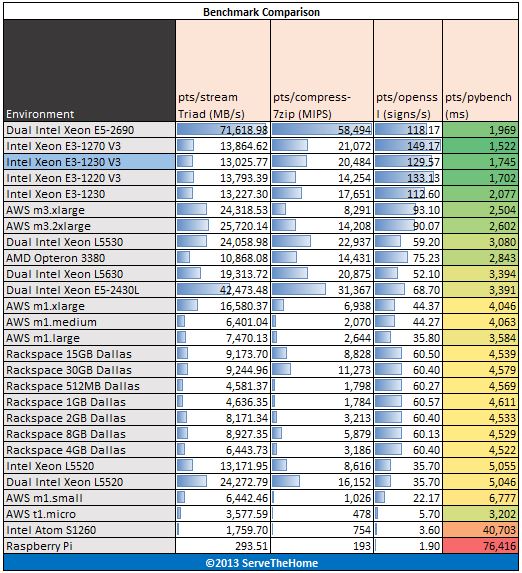
On the PTS tests we can see that the platform is still limited to only a dual channel memory configuration. This is one area where it would be great to see some improvement on. Although competitive in single-threaded applications, the dual Intel Xeon E5 platforms and even older generation platforms do well in these tests.
Intel Xeon E3-1230 V3 Power Consumption
Power consumption we saw is a bit of a trade-off with the Haswell generation. In our Intel Core i7-4770 review, we saw the Haswell generation provide noticeable idle power consumption and also a bit higher load power consumption.
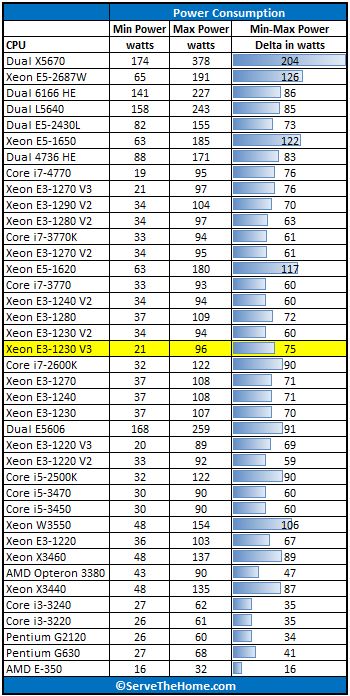
Power is right in line with what we saw on previous Haswell Xeon tests. This makes sense given the same underlying architecture and similar TDPs.
Conclusion
Overall, the Intel Xeon E3-1230 V3 is a strong choice. There is clear IPC improvement in our testing. Many servers, especially in the home and SMB segments spend much of their time at idle. That is where the Intel Xeon E3-1230 V3 shines. Whereas the Intel Xeon E3-1270 V3 may make the most sense in datacenter applications, the Intel Xeon E3-1230 V3 provides a lower cost per unit that can be attractive when one does not need that last ounce of performance. Also for SMB applications such as mail servers and file servers, the Intel Xeon E3-1230 V3 is a strong contender.

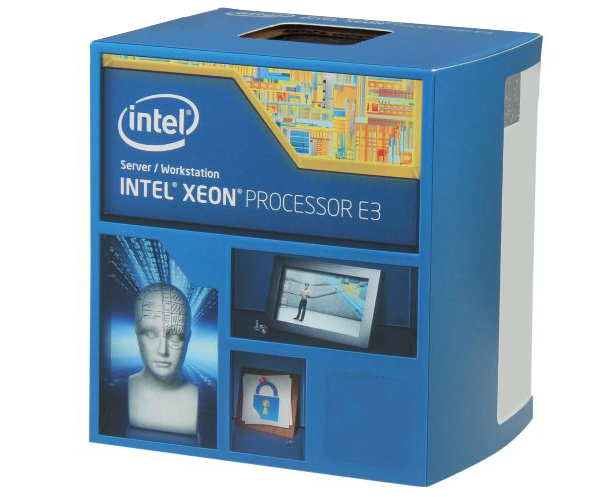
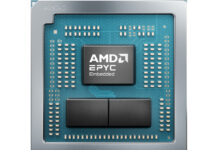

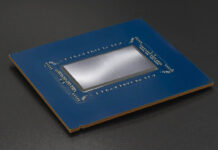
Hi STH
I’m wondering how possible it would be for a review on the E3-1230L v3 or even E3-1260L v3
Many sites have the E3-1230L v3 listed as a 25W TDP and 2 cores 4 threads.
http://ark.intel.com/products/75053/Intel-Xeon-Processor-E3-1230L-v3-8M-Cache-1_80-GHz
has it listed has 4 cores 8 threads. At 25W TDP makes it a very interesting CPU. I suppose Intel should be the ones that have it right?
I looking to build a haswell server with hopefully the lowest power consumption I can manage
without affecting performance too much.
John
Hi John,
We will try to do this. It has been a request in previous generations so will see if we can slot it in soon.
Regards,
Patrick
Pity a v2 version of the chip wasn’t included in the benchmarks.Interested to see how they compare
Those idle numbers for haswell is quite impressive. It’s a great 24/7 electricity saver. Was wondering if its possible to achieve these results with older generation intel cpu.
I had posted earlier with my asus z8pe-d12 with intel l5520 an 48gb ram running at 56w idle. Long idle is at 48watt
Has anyone been able to achieve lower than idle numbers on older intel CPUs?
Patrick, please note that the majority of 1225 v3 Xeons DO have hyper-threading. All boxed and part of the tray CPUs do: http://www.cpu-world.com/CPUs/Xeon/Intel-Xeon%20E3-1225%20v3.html .
Hi Bob, that link says the E3-1225 V3 does not have HT. Also, the Intel ARK site (official specs) confirms no HT: http://ark.intel.com/products/75461/Intel-Xeon-Processor-E3-1225-v3-8M-Cache-3_20-GHz?q=e3-1225
What about cinebench Patrick? Does it perform 0.5 pts better than the V2? I own one 1230V2 but that V3 idle power consumption is great :)
I have not had the chance to run the V3 though Cinebench. What I might offer is that I compared the E3-1275 V1 V2 and V3 in this Tom’s Hardware piece: http://www.tomshardware.com/reviews/xeon-e3-1275-v3-haswell-cpu,3590-8.html
Well, doing the math and since my V2 is able to do 7pts one can expect around 7.3 from the V3. Thanks Patrick!